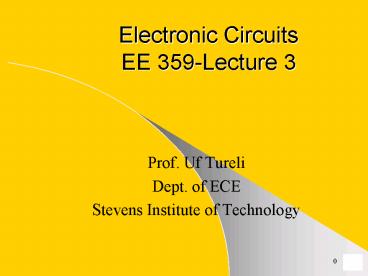Electronic Circuits EE 359-Lecture 3 - PowerPoint PPT Presentation
1 / 28
Title:
Electronic Circuits EE 359-Lecture 3
Description:
Electronic Circuits EE 359-Lecture 3 Prof. Uf Tureli Dept. of ECE Stevens Institute of Technology Course Outline Syllabus and announcements http://koala.ece.stevens ... – PowerPoint PPT presentation
Number of Views:99
Avg rating:3.0/5.0
Title: Electronic Circuits EE 359-Lecture 3
1
Electronic CircuitsEE 359-Lecture 3
- Prof. Uf Tureli
- Dept. of ECE
- Stevens Institute of Technology
2
Course Outline
- Syllabus and announcements
- http//koala.ece.stevens-tech.edu/utureli/EE359
- HW 1 due today
- 5th Ed. 2.100,3.18,3.19,3.26
- HW 2 due Friday
- 3.52, 3.72, 3.66 , 3.98
3
Small Signal Model
- Small signal, biased operation
4
Diode Model
- As a resistor with value equal to reciprocal of
the slope of the i-v curve - Linearization around bias point VD and time
varying signal vd(t) is superimposed. - Current due to VD
- Approx.
5
Small Signal Approximation
6
Equivalent circuit model
- For small changes around bias point Q is
reciprocal of tangent - VD0 is the intercept of the tangent on the vD
axis
7
Separate DC and small signal analysis
8
Practical Diode Circuit
- Diode charges capacitor.
- The diode is assumed ideal. It will only conduct
when vI is more than vo
9
Rectifier
- Voltage and current waveforms in the peak
rectifier circuit with CR ?? T. - The diode is assumed ideal.
10
Basic Limiting Ckts
11
BJT Transistor
- Three terminal device
- Three semiconductor regions, above is pnp
- E Emitter, B Base, C Collector
- Voltage between two terminals to control current
- Use as Amplifier or Switch
12
NPN Transistor
- Current flow in an npn transistor biased to
operate in the active mode - Forward bias of Emitter-Base Junction current
flows to emitter, electrons move towards base,
holes to emitter - Reverse bias of Base-Collector Junction IC
independent of VCB
13
- Minority carriers in the emitter of npn
transistor operating in the active mode vBE ? 0
and vCB ? 0. - Electron concentration highest at emitter side,
and lowest at collector side on the p region
(base in npn transistor)
14
Equivalent Circuit
- iC indep of VCE
- Nonlinear voltage controlled source
15
Current Controlled Source
- Change voltage controlled source to current
controlled source
16
Simplify Models
- Voltage Controlled Model
17
Simplify Current Controlled Source Model
- Transistor as two port network with input B and
output C. - Current gain b
- Constant n1 except
- High currents
- Low currents
- Where n2 .
18
PNP Transistor
- Current in PNP mainly due to holes injected from
emitter to base
19
Large-signal models
- for the pnp transistor operating in the active
mode. - Identical to PNP, replace vBE by vEB
20
BJT Characteristics
- iC-vCB characteristics for an npn transistor in
the active mode. - Collector is constant current source only
controlled by emitter current iC
21
BJT Characteristics
Conceptual circuit for measuring the iC-vCE
characteristics of the BJT. (b) The iC-vCE
characteristics of a practical BJT.
22
Transistor as an amplifier. (b) The circuit of
(a) with the signal source vbe eliminated for dc
(bias) analysis.
23
Small Signal Analysis
- Linear operation of the transistor small-signal
- vbe triangular waveform is superimposed on dc
voltage VBE. - Collector signal current ic, also of triangular
waveform, superimposed on the dc current IC. - Ic gm vbe, where gm is the slope of the ic -
vBE curve at the bias point Q.
24
BJT as Amplifier
BJT as a current-controlled current source (a
current amplifier).
BJT as a voltage-controlled current source ( a
transconductance amplifier)
25
T-MODEL
Emitter resistance re rather than the base
resistance r? featured in the hybrid-? model.
Current-controlled current source representation.
Voltage-controlled current source
26
Transistor Amplifier
Example
- NPN
- Quiescent point
27
Small Signal Analysis
28
Small Signal































